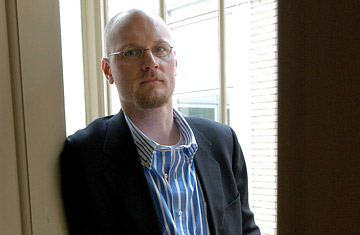
Author Augusten Burroughs
Christmas has not been kind to Augusten Burroughs. But in his inimitable style, the New York Times best-selling author of Running with Scissors, Dry and A Wolf at the Table turns his smorgasbord of cringe-worthy seasonal memories — a one-night stand with an aging Frenchman in a Santa suit, a holiday spent among the homeless — into an improbably merry, touching read. You Better Not Cry: Stories for Christmas hit shelves Oct. 27. TIME caught up with Burroughs to chat about why he writes, what he reads and memoirists who lie.
You've had some pretty awful luck with Christmas. What do you have planned this year?
My partner and I have split after about a decade together. So there you go. It keeps going. But what I've found is these holidays that I always think are so horrible actually aren't quite that horrible. It's like when our house flooded [one Christmas]. The way our neighbor responded, it wasn't just that she helped. And it wasn't that she later brought over a basket of sandwiches. There was something nearly indescribable in the way that she offered herself, the way she gave herself. That was, looking back, just a tremendous holiday.
You say in the book that she gave you the gift of grace.
Right. It's not the book I thought I would write. I thought I would write something that was just funny. But I don't have control over that; my subconscious does the writing. And I like it better than I would have, I think. It's got some stories in there that are a little heavy for holiday reading. But holidays are a heavy, heavy time. We make light of them with our red and green and our stockings and candy canes, but people think heavy thoughts over the holidays because that's when you're thinking about family. Are we close? Or are we not as close as other people? I think [the season] warrants more introspection than it's usually given.
I read an interview from 2006 in which you said you felt like you were done writing about your own life.
Oh, you know us memoirists. All we do is lie. I hate saying it, because it's going to sound awful: "Memoirist Says Writing 'Cathartic.' " But it is. I definitely want to write novels, but I seem to have to continue to process these other events. My next book is not a novel, but it's also not a memoir. It's a very different book.
Can you say more?
No, because it's a surprise. If I told you, you'd be horrified. It's going to be good. It's the book I was born to write.
Speaking of writing to process things, you're pretty unflinching. Is there ever something that just feels too personal?
I have found that no matter what I've written, someone somewhere has come up to me and said, "Me too." The truth can be offensive, but it's always nourishing, in a way. You recognize it. You can feel it. And even if [readers] think, "My god, I would never get in those situations," within those ridiculous circumstances that I have created for myself, they know the way I respond is probably what they would do too.
You mentioned that when something is true you can feel it and recognize it.
Well, obviously, I guess, that's not true because there are a bunch of memoirs that [were falsified]. They must have had something in there that rang true to people, like good novels. I haven't even read any of those memoirs. I don't read memoirs. But if you write a memoir, I would think you'd want people to know, "O.K., look, I've taken some liberties here." It's just a matter of being open with your readers.
Do you think you come under unfair scrutiny because of other memoirists who haven't told the truth?
If I step outside myself, no. Let's face it: I've written six memoirs now, and I'm 44. That's a lot. And some might say I haven't had nearly as much happen to me as I've said in my memoirs. I can see how people would believe that. So I don't know that I would call it unfair. It has been irritating in the past because I have felt like, All right, I don't know how to prove this to you. I've done all my little memory tricks and I don't know why I remember [what I do]. Cut my brain open.
So you don't read memoirs?
I have read some. I don't read a lot of memoirs. I'm very narrow in all my interests. I am cut from the same cloth as my older, Aspergian brother and probably Aspergian father. If I could, I would eat the same exact thing every day. It would be just protein bars and nothing else, no deviation ever.
Does being set in your ways extend to your writing process?
I would imagine so. I never question the way I write. Writing is the only thing that's without seams for me. It's an effort to talk because my pictures have to be turned into these sounds. It's an effort to be alive. It's work. But writing is wonderful.
